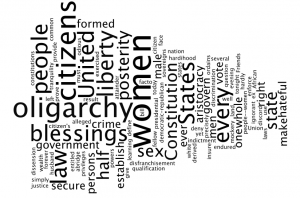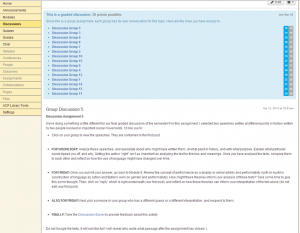One of the major goals of higher education is to cultivate students’ critical thinking skills (Roth, 2010). In order to be prepared for the workplace and to be an informed citizen, students need to be able to base judgments, make decisions, and solve problems based on the careful critique of available evidence. Engagement, defined as the active involvement and commitment to a task, has been found to be positively related to gains in critical thinking (Tsui, 2002). In online courses, asynchronous discussions are often used to engage students in course topics and as a space to demonstrate critical thinking skills, but previous studies have found mixed results.
Incorporating word clouds, which are visual representations of text, is one strategy that may help students engage with the material in a more critical way than a typical question-and-answer format. In looking at the words in a non-linear fashion, students have less preconceived notions about the text and can make connections between key terms and ideas. Joyner (2012) found that online discussions which incorporated word clouds revealed gains in critical thinking and meaningful interaction.
Link to example artifact(s)
- Professor: Dr. Beatriz Reyes-Foster, Associate Professor, Anthropology, College of Sciences, UCF
- Course Title: ANT3610: Language and Culture

In this blended course, word clouds were incorporated into an online group discussion. The prompt asked students to analyze two speeches with the author names omitted (please see the Example of a Word Cloud on the left), with half of the class viewing the speeches in word cloud form only. Students were asked to guess who wrote them, when they were written, and why they were written. A second post asked them to relate course content to their analysis, and the final post asked them to reply to a peer who had reached a different interpretation. Please refer to the Instructions for Group Discussion artifact for full details.

In a recent study concerning this assignment, the word cloud groups had moderately higher scores regarding critical thinking and engagement on a survey. They also had higher scores with regards to peer interaction. Analyzing speeches in the form of word clouds forced students to articulate their thought processes and more actively process the material, since they could not rely on quotes or reference the narrative. Students were interested to see how other students arrived at their conclusions.
- For full details about this assignment and study, please review the slides from the 2014 Information Fluency conference.
These results suggest that a word cloud can be an effective strategy when the focus of the discussion is on the process of thinking rather than the product (for instance, there were instances where a student did not guess the author correctly, but did demonstrate critical thinking). It is important to be very clear with the instructions and explain why a word cloud is being used for the assignment. Following up with students is also recommended.
Link to scholarly reference(s)
deNoyelles, A., & Reyes-Foster, B. (2015). Using word clouds in online discussions to support critical thinking and engagement. Online Learning Journal, 19(4), 1-12.
https://olj.onlinelearningconsortium.org/index.php/olj/issue/view/45
Joyner, F. (2012). Increasing student interaction and the development of critical thinking in asynchronous threaded discussions. Journal of Teaching and Learning with Technology, 1(1), 35-41.
Roth, M.S. (2010). Beyond critical thinking. https://chronicle.com/article/Beyond-Critical-Thinking/63288/
Tsui, L. (2002). Fostering critical thinking through effective pedagogy: Evidence from four institutional case studies. The Journal of Higher Education, 73(6), 740-763.
Citation
deNoyelles, A., & Reyes-Foster, B. (2015). Use word clouds to enhance critical thinking. In B. Chen & K. Thompson (Eds.), Teaching Online Pedagogical Repository. Orlando, FL: University of Central Florida Center for Distributed Learning. https://topr.online.ucf.edu/use-word-clouds-to-enhance-critical-thinking/.